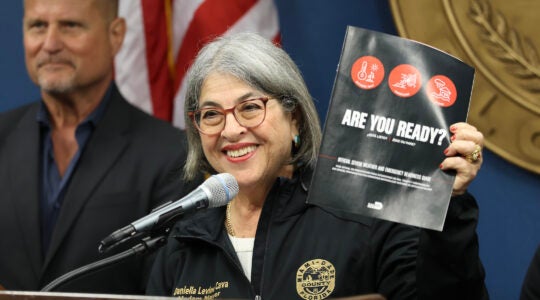(JTA) — An influential progressive political action committee denounced a bipartisan measure targeting boycotts of Israel and its settlements.
MoveOn.org, an influential liberal public policy advocacy group and PAC that raises money for progressive political candidates, criticized the Israel Anti-Boycott Act on Twitter.
“Regardless how you feel about BDS, Congress must reject action to criminalize free speech and peaceful protest. The Democrats in House and Senate must say no to H.R. 1697/S. 720,” MoveOn.org tweeted, referring to the House and Senate versions of the bill.
“Free speech and peaceful protest are integral to democracy,” the group added.
The bill, introduced in March in both the House and Senate, would expand 1970s-era laws that make illegal compliance with boycotts of Israel sponsored by governments — laws inspired at the time by the Arab League boycott of Israel — to include boycotts backed by international organizations. Those adhering to boycotts would be subject to fines.
While the measure is aimed at the Boycott, Divestment and Sanctions movement, it also targets efforts by the United Nations and the European Union to distinguish between products manufactured in Israel from those manufactured in West Bank settlements.
On Twitter, MoveOn.org linked to a letter issued Monday by the American Civil Liberties Union urging senators to oppose the bill.
“We take no position for or against the effort to boycott Israel or any foreign country, for that matter,” wrote Faiz Shakir, ACLU’s national political director. “However, we do assert that the government cannot, consistent with the First Amendment, punish U.S. persons based solely on their expressed political beliefs.”
The Israel Anti-Boycott Act was drafted with the assistance of the American Israel Public Affairs Committee and has the support of Christians United for Israel. The Senate version was introduced by Sens. Ben Cardin, D-Md., and Rob Portman, R-Ohio, and has 42 co-sponsors from both parties, while the House version was introduced by Reps. Peter Roskam, R-Ill., and Juan Vargas, D-Calif., and has 230 co-sponsors.
JTA has documented Jewish history in real-time for over a century. Keep our journalism strong by joining us in supporting independent, award-winning reporting.






